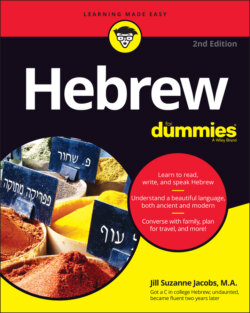Читать книгу Hebrew For Dummies - Jill Suzanne Jacobs - Страница 12
Taking Stock of What’s Familiar
ОглавлениеIf you’ve ever been to a synagogue or had a bit of Jewish education, you probably know a little Hebrew already. But even if you’ve never walked through a synagogue’s door or studied anything Jewish, you probably still know some Hebrew words. You’ve probably heard the word amen, for example. That word is Hebrew! Amen comes from a word meaning “faith” or “belief,” and people usually say it at the end of a prayer. And the word Hallelujah? Hebrew again! The word literally means “Praise God.” Even the word alphabet derives from the Hebrew words for the first two letters of its alphabet, aleph and bet. (To see what the Hebrew alphabet looks like, check out “Recognizing Tips to Help You Read Hebrew” later in this chapter.)
You may have heard other Jewish words, of course, such as שלעפּ (shlehp; to drag or pull) and קְוֶעְהְהָשׁ (kvehtsh; to complain), which are actually Yiddish (the language of the Jews of Eastern Europe combining Old High German, Hebrew, and other languages) and are part of the Israeli vernacular today. You may never have thought about other words that have Hebrew roots. Did you know that cinnamon is a derivative of the Hebrew word קִנָּמוֹן (kee-nah-mohn), which appears in the biblical book The Song of Songs? The English word dilute may derive from the Hebrew word דַּל (dahl), which means “weak” or “thin” and first appears in the biblical book of Genesis.
Some people claim that Hebrew is the mother of all languages. No matter what its history or origin, Hebrew, a language that has its origins in the Fertile Crescent, has crept into North American spoken English. This process works in reverse, too, as many English words and phrases have crept into the Hebrew language. Interestingly enough, although you as an English speaker may identify some words as English, some of them derive from Italian and French, which shows the universality of certain words. But if you say the following words with an Israeli accent, you’re speaking Hebrew!
Hamburger
Macaroni
Pizza
Cafe
Radio
Internet
Telephone
Incidentally, The Academy for Hebrew Language, the institute responsible for creating Modern Hebrew words, created an authentic Hebrew word for the telephone. The academy called the telephone a שָׂח-רָחוֹק (sahch-rah-chohk), which put together the words for conversation and long distance. So, telephone translated as “long-distance conversation.” Pretty clever, huh? This word didn’t stick with the Israeli public, however, so הֵלֵפוֹן (telephone) it is.
